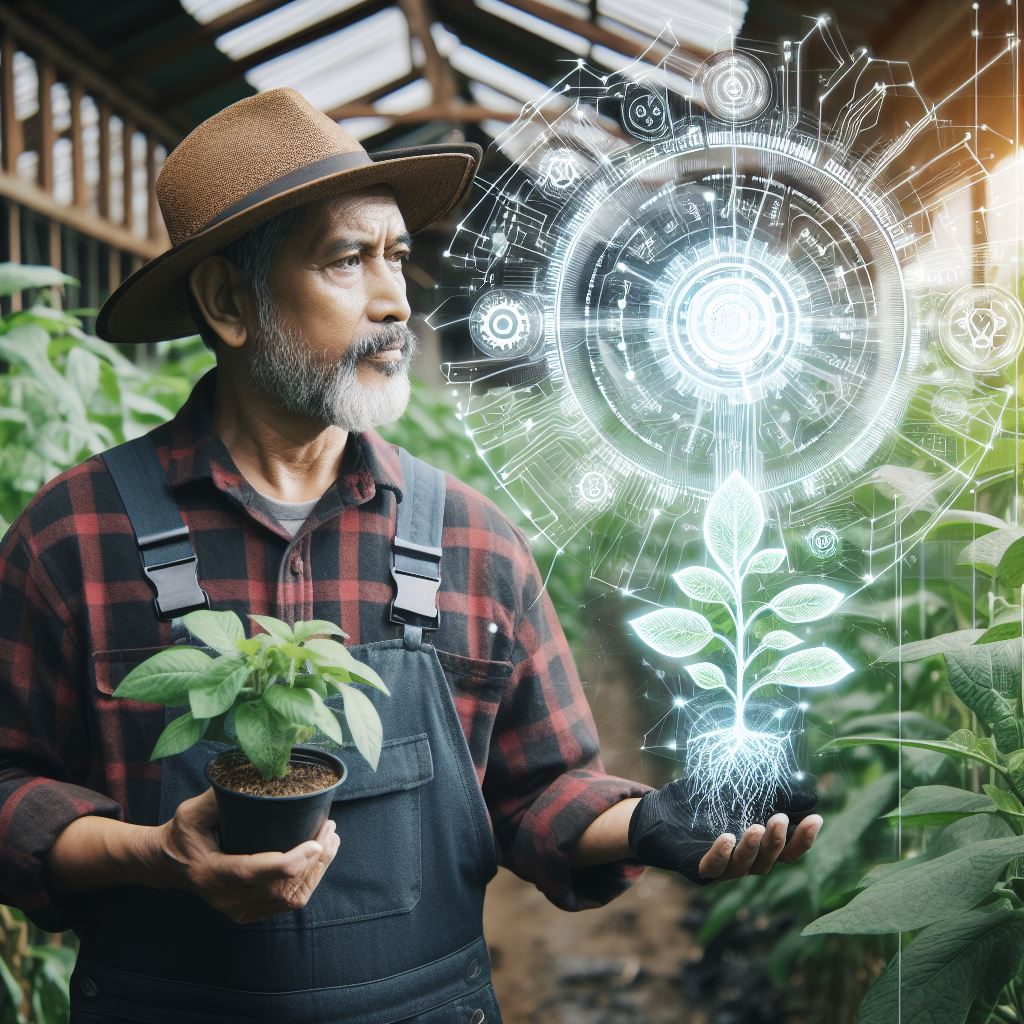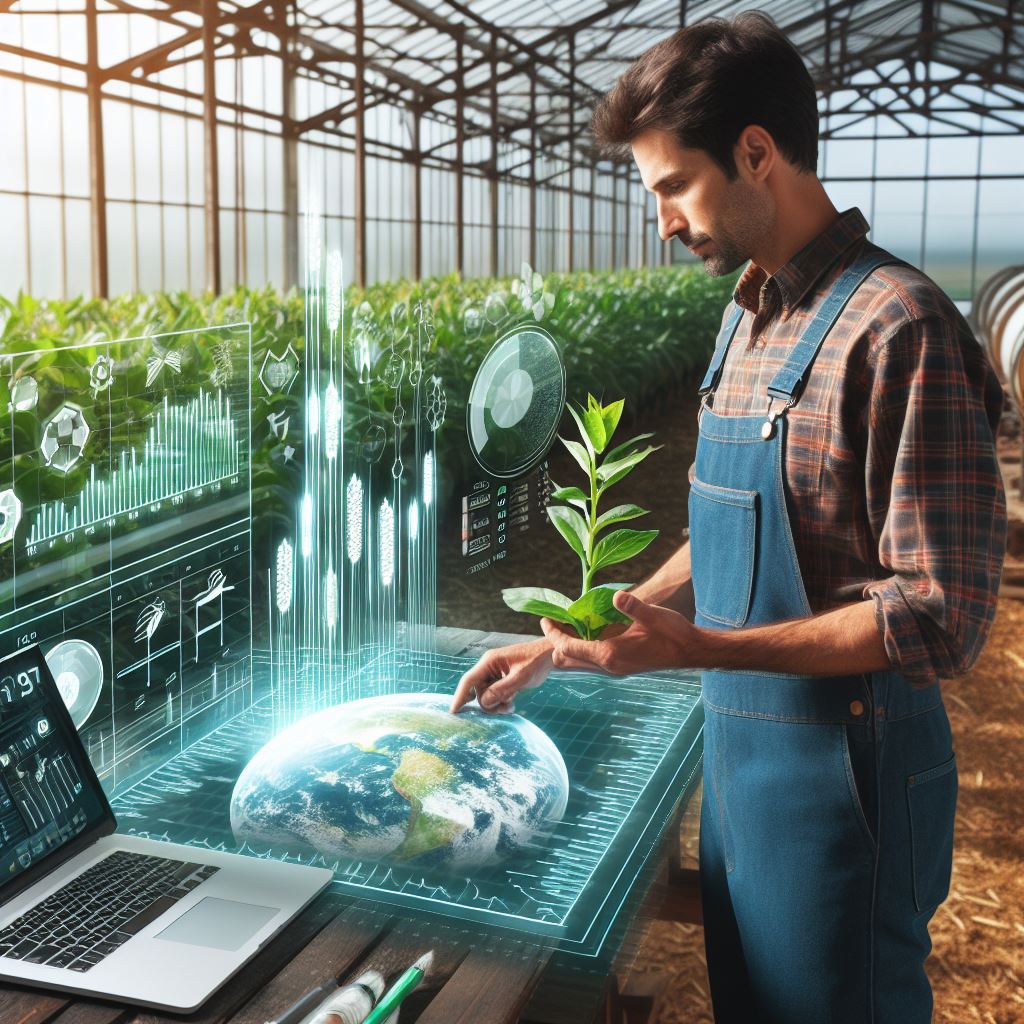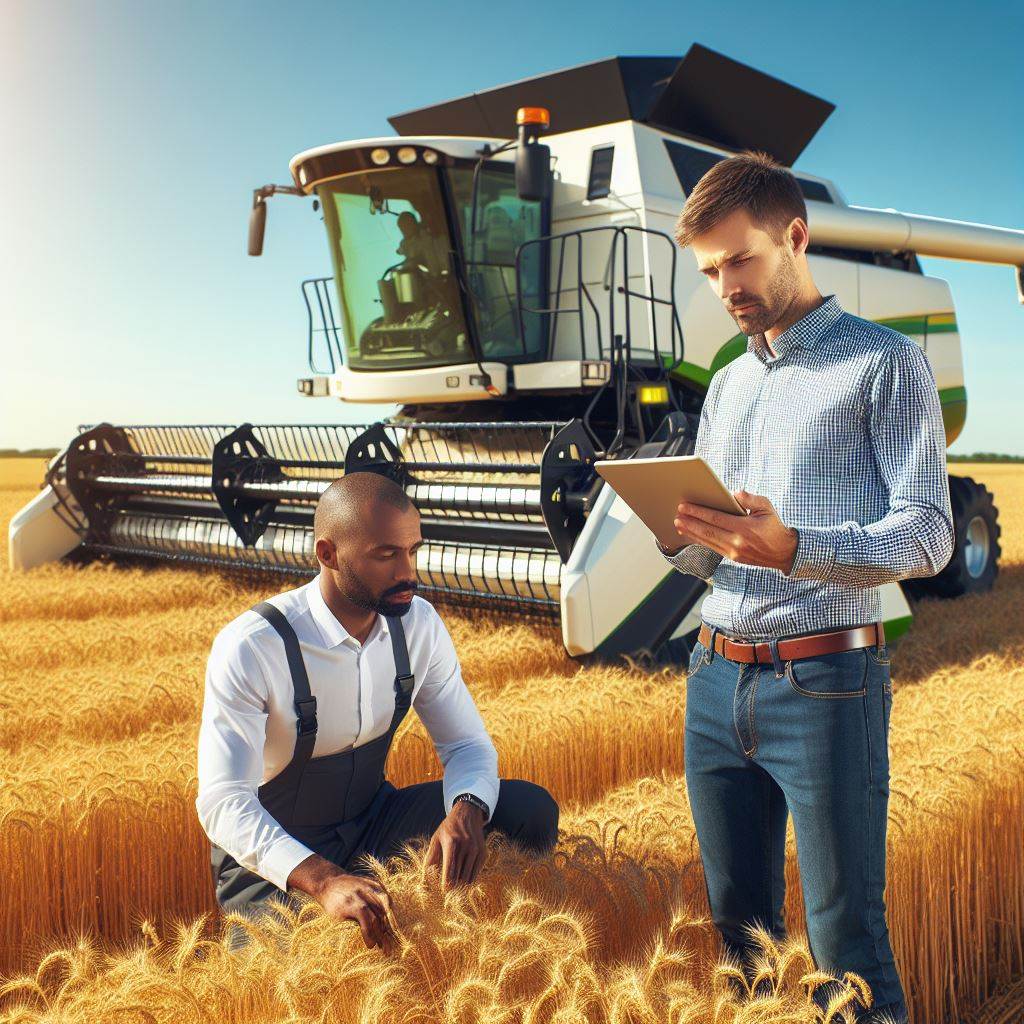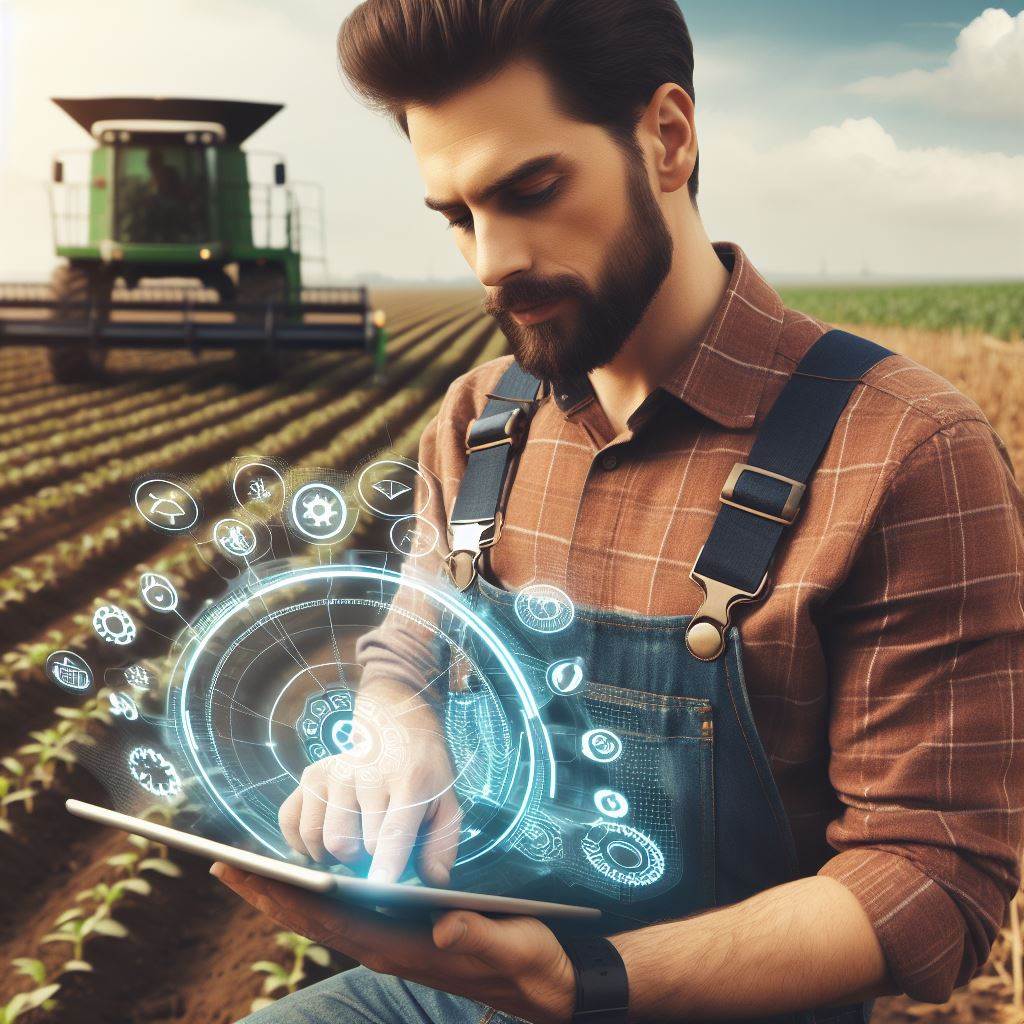Introduction
The concept of AI in farming
Agriculture has come a long way, and with the advent of technology, it has witnessed significant advancements.
One such breakthrough is the integration of Artificial Intelligence (AI) in farming practices.
AI has revolutionized various industries, and agriculture is no exception.
Importance of sustainable growth in agriculture
Sustainable growth is a fundamental concept that needs to be embraced in agriculture.
It entails ensuring that agricultural practices meet the needs of the present without compromising the ability of future generations to meet their own needs.
Sustainable growth is crucial to conserve natural resources, protect the environment, and maintain the long-term viability of agriculture.
AI for sustainable growth in farming
In this blog post, our main focus will be on discussing the role of AI in achieving sustainable growth in farming.
AI offers a multitude of benefits that can contribute to sustainable agriculture.
From precision farming techniques to data-driven decision-making, AI enables farmers to optimize their operations while minimizing negative impacts on the environment.
The power of AI lies in its ability to process and analyze vast amounts of data.
By collecting data from various sources such as sensors, drones, and satellites, AI can provide valuable insights for farmers.
These insights can help in optimizing the use of resources such as water, fertilizers, and pesticides, thus reducing waste and minimizing environmental damage.
Furthermore, AI-powered technologies like automated robotic systems and smart sensors can perform tasks with higher efficiency and accuracy.
This not only improves productivity but also reduces the reliance on manual labor and minimizes the risk of human errors.
Basically, AI has immense potential in promoting sustainable growth in farming.
Transform Your Agribusiness
Unlock your farm's potential with expert advice tailored to your needs. Get actionable steps that drive real results.
Get StartedBy harnessing the power of technology, farmers can optimize their operations, reduce environmental impact, and ensure the long-term viability of agriculture.
In the following sections, we will explore specific applications of AI in different aspects of farming and its impact on sustainable growth. Stay tuned!
The Role of AI in Farming
Agriculture is one of the oldest industries in the world, providing food for billions of people.
However, with the growing global population and the increasing pressures on the environment, there is a need for more sustainable and efficient farming practices.
This is where artificial intelligence (AI) comes into play.
What artificial intelligence is
Artificial intelligence refers to the simulation of human intelligence in machines that are programmed to think and learn like humans.
It involves the development of computer systems that can perform tasks that would normally require human intelligence, such as visual perception, speech recognition, decision-making, and problem-solving.
The potential benefits of AI in agriculture
- Improved efficiency and productivity: AI can analyze large amounts of data collected from sensors, drones, and satellites to optimize farming operations and maximize yields. This leads to increased efficiency and productivity.
- Reduction in resource waste: By using AI-powered systems, farmers can minimize the use of water, fertilizers, and pesticides, as AI can provide precise recommendations on when, where, and how much to apply.
- Enhanced decision-making capabilities: AI algorithms can process and analyze vast amounts of information to provide farmers with real-time insights and recommendations. This empowers them to make data-driven decisions for better outcomes.
Providing examples of AI applications in farming
- Automated crop monitoring and management: AI can monitor crop health and growth by analyzing images captured by drones or satellites. It can detect diseases, nutrient deficiencies, and irrigation issues, allowing farmers to take timely action.
- Precision farming: AI-enabled precision farming involves using sensors and robotic systems to tailor farming practices to individual plants or animals. It ensures optimal conditions for growth and reduces waste.
- Intelligent pest control: With AI, farmers can identify and differentiate between beneficial insects and harmful pests. This enables targeted pest control measures, minimizing the use of pesticides and preserving ecological balance.
- Predictive analytics for weather and yield forecasting: AI algorithms can analyze historical weather data, crop characteristics, and other factors to predict future weather patterns and crop yields. This helps farmers plan their operations and mitigate risks.
In general, artificial intelligence has the potential to revolutionize the agriculture industry.
By leveraging AI technologies, farmers can achieve improved efficiency, reduced resource waste, and enhanced decision-making capabilities.
Moreover, various AI applications such as automated crop monitoring, precision farming, intelligent pest control, and predictive analytics offer practical solutions to the challenges faced by the farming community.
Adopting AI farm tech for sustainable growth in agriculture can lead to more sustainable practices, higher yields, and ultimately, contribute to the goal of achieving global food security.
Read: Precision Agri: The Tech Revolution
AI’s Contribution to Sustainable Growth in Farming
Challenges Faced by Traditional Farming Methods
- Overuse of resources: Conventional farming often leads to excessive water consumption, energy usage, and depletion of natural nutrients.
- Environmental degradation: Traditional practices contribute to soil erosion, water pollution, deforestation, and biodiversity loss.
- Food waste: Inefficient farming techniques result in post-harvest losses and food waste, exacerbating global hunger and economic losses.
How AI Can Address These Challenges
- Optimal resource utilization through data analysis: AI algorithms analyze data on soil health, weather patterns, and crop growth to minimize resource wastage.
- Precision farming for reduced use of chemicals and fertilizers: AI-powered sensors and drones enable targeted application of inputs, reducing environmental impact.
- Enhanced crop disease and pest detection, leading to targeted treatments: AI algorithms identify disease symptoms and pest infestations early, allowing farmers to take prompt and precise action.
The Potential for Increased Production and Profitability with Sustainable Practices
Sustainable farming practices, facilitated by AI, offer significant benefits:
- Higher productivity: By optimizing resource allocation and reducing crop losses, AI enables increased yields and overall productivity.
- Cost savings: Precision farming techniques minimize input wastage, leading to reduced expenses on fertilizers, chemicals, and water.
- Improved profitability: Higher yields and reduced production costs translate into improved profitability for farmers.
- Environmental stewardship: AI-driven sustainable practices mitigate the negative environmental impacts associated with traditional farming methods.
- Climate change resilience: AI enables farmers to adapt to changing climatic conditions by providing real-time data and predictive analytics.
- Enhanced food security: The ability to maximize crop production and reduce food waste contributes to global food security and addresses hunger challenges.
AI’s potential in revolutionizing sustainable agriculture is already evident.
Numerous breakthroughs in the field demonstrate how technology and innovation can transform traditional farming practices.
By adopting AI solutions, farmers can optimize resource usage, minimize ecological harm, and simultaneously enhance productivity and profitability.
Provide recommendations for crop rotation, irrigation schedules
Furthermore, AI algorithms can provide recommendations for crop rotation, irrigation schedules, and planting techniques specific to individual farms, allowing farmers to make informed decisions that maximize yield and minimize waste.
Moreover, AI-powered drones and robots can perform labor-intensive tasks, such as planting seeds, monitoring crop health, and harvesting, more efficiently and accurately.
However, the widespread adoption of AI farm tech for sustainable growth in farming also requires addressing certain challenges.
Access to advanced technology and the necessary infrastructure, especially in developing regions, must be ensured.
Additionally, the potential risks associated with data privacy, algorithm bias, and dependency on technology should be carefully managed.
In essence, AI has the potential to revolutionize farming practices, making them more sustainable and environmentally friendly.
By leveraging AI’s capabilities, farmers can optimize resource usage, reduce environmental degradation, and enhance productivity and profitability.
Embracing AI farm tech for sustainable Growth, this technological advancement in agriculture will be crucial for ensuring food security, economic growth, and ecological resilience in the face of global challenges.
Showcase Your Farming Business
Publish your professional farming services profile on our blog for a one-time fee of $200 and reach a dedicated audience of farmers and agribusiness owners.
Publish Your ProfileRead: Yield Prediction: AI’s New Frontier

Implications and Limitations of AI in Farming
The integration of Artificial Intelligence (AI) in farming holds immense potential for sustainable growth.
However, it is important to address the implications and limitations associated with this technology.
This section will discuss the concerns regarding job displacement, the need for data privacy and security, as well as the challenges faced in implementing AI in farming.
Concerns regarding job displacement
How AI can complement human labor, not replace it
There is a prevailing concern that AI in farming will lead to job losses for human workers.
However, it is important to emphasize that AI is designed to complement human labor, not replace it entirely.
AI technologies excel at automating repetitive and mundane tasks, freeing up human workers to focus on more complex and strategic activities.
By taking over time-consuming activities like data analysis or repetitive crop monitoring, AI can enhance the efficiency and productivity of human labor.
Potential job opportunities created by AI in agriculture
While some jobs may be affected, the integration of AI in agriculture also creates new job opportunities.
The maintenance and management of AI systems will require skilled professionals who can ensure their proper functioning and optimization.
Additionally, the abundance of data generated by AI systems will necessitate experts in data analysis and interpretation, providing employment prospects for individuals with data science backgrounds.
Therefore, AI in agriculture can contribute to job creation and skill diversification within the farming sector.
The need for proper data privacy and security in AI applications
The use of AI in farming relies heavily on the collection and analysis of large amounts of data.
This raises concerns regarding data privacy and security.
Farmers must ensure that their data and intellectual property are adequately protected.
Implementing robust security measures, such as encrypted data transmission and storage, is crucial to safeguard against potential breaches or unauthorized access.
Consideration should also be given to data ownership and control, ensuring that farmers maintain ownership of their data and have full control over its usage.
The limitations and challenges associated with AI in farming
Dependence on reliable data sources and connectivity
The accuracy and effectiveness of AI in farming rely on access to reliable data sources, including weather data, soil conditions, and crop information.
In areas with limited connectivity or unreliable data sources, the performance of AI systems may be compromised.
Therefore, efforts should be made to improve infrastructure and data availability in order to maximize the potential benefits of AI technology in farming.
Initial investment costs for AI technologies
Implementing AI technologies in farming requires a substantial initial investment.
The cost of acquiring AI systems, sensors, and other hardware can be expensive for farmers, especially smaller-scale operations.
Additionally, ongoing maintenance and updates may also require financial resources.
Policymakers and stakeholders should explore possibilities for financial support, subsidies, or incentives to facilitate the adoption of AI in farming, ensuring it is accessible to all farmers.
The importance of continuous education and training for farmers
To effectively utilize AI systems, farmers need to acquire the necessary skills and knowledge.
Continuous education and training programs are essential to enable farmers to understand and maximize the potential of AI technologies.
By providing access to training programs and resources, farmers can learn how to interpret AI-generated data, make informed decisions, and troubleshoot potential issues.
Collaboration between agricultural institutions, tech companies, and governmental bodies can facilitate the dissemination of knowledge and support farmers in incorporating AI into their farming practices.
In a nutshell, while the integration of AI in farming presents exciting opportunities for sustainable growth, it is essential to consider the implications and limitations of this technology.
By addressing concerns regarding job displacement, ensuring data privacy and security, and acknowledging the challenges associated with AI farm tech for sustainable growth implementation, the agricultural industry can navigate this technological revolution in a responsible and inclusive manner.
Through proper understanding, training, and strategic investments, AI farm tech for sustainable growth can contribute significantly to the advancement of farming practices, ultimately leading to enhanced productivity, resource efficiency, and environmental sustainability.
Read: Smart Farming: AI’s Growing Impact
Case Studies and Success Stories
Real-life examples of AI implementation in agriculture
- Using AI-powered drones in crop monitoring has resulted in higher yields and reduced labor costs.
- AI-based automated irrigation systems have improved water efficiency, leading to water conservation and increased crop quality.
- Implementing smart sensors and AI algorithms for pest detection has significantly reduced crop losses and the use of pesticides.
- AI-driven robots have revolutionized harvesting processes, increasing efficiency and crop quality while reducing labor needs.
Outcomes and benefits achieved
- The use of AI-powered drones in crop monitoring has led to a 25% increase in crop yields.
- AI-based automated irrigation systems have reduced water usage by up to 40% without compromising crop quality.
- Pest detection through smart sensors and AI algorithms has reduced pesticide use by 50% and minimized crop losses.
- The implementation of AI-driven robots in harvesting processes has resulted in a 30% reduction in labor costs and improved crop quality.
Challenges faced during the implementation process
- One challenge faced during AI drone implementation was the need for skilled operators to ensure accurate data collection and analysis.
- The main challenge in implementing automated irrigation systems was the initial investment required for installing sensors and setting up AI algorithms.
- Pest detection through AI algorithms faced challenges in accurately distinguishing between harmful pests and beneficial insects.
- The implementation of AI-driven robots required extensive testing and customization to adapt to different crops and farm layouts.
Potential impact of these successful cases on the future of sustainable farming
The successful implementation of AI technologies in agriculture showcases the immense potential for sustainable farming practices.
- Increased crop yields through AI-powered crop monitoring have the potential to address global food security challenges.
- Water conservation achieved through AI-based automated irrigation can contribute to sustainable water management in farming.
- Reduced pesticide use resulting from AI-driven pest detection promotes environmentally friendly farming practices.
- The use of AI-driven robots in harvesting processes can enhance labor efficiency and reduce reliance on manual labor.
These success stories in AI implementation provide a roadmap for the future of sustainable farming.
By leveraging AI technologies, farmers can optimize resource utilization, minimize environmental impact, and achieve long-term economic viability.
It is crucial for farmers, researchers, and policymakers to collaborate and further explore the potential of AI farm tech for sustainable growth in agriculture to ensure food security and sustainability in the face of increasing global challenges.
Read: AI in Farming: Boosting Yields Smartly
Learn More: Solar Power in Farms: A Green Revolution
Conclusion
Recap the benefits of AI for sustainable growth in farming
AI has demonstrated immense potential to enable sustainable growth in the agriculture industry.
As discussed, AI-powered analytics provide actionable insights to boost yields, reduce costs, and elevate profitability.
Showcase Your Farming Business
Publish your professional farming services profile on our blog for a one-time fee of $200 and reach a dedicated audience of farmers and agribusiness owners.
Publish Your ProfileMeanwhile, predictive capabilities allow for precise resource planning to minimize waste.
Most importantly, these optimizations considerably lighten agriculture’s environmental footprint.
However, realizing these sustainability goals remains contingent on farmer adoption.
Transitioning to AI-enabled precision agriculture requires investment in sensors, connectivity, and data analytics.
For farms facing narrow profit margins, this proves daunting despite impressive ROI.
Additionally, overcoming reluctance towards data sharing is critical as AI improvement depends on accumulation of quality training data.
The potential of AI to address challenges in the agriculture industry
Still, AI brings hope for addressing rising food insecurity and environmental pressures.
By following sustainable practices augmented with machine learning, farms can increase productivity while benefiting surrounding ecosystems.
The future of our food supply likely hinges on such an AI-powered green revolution.
Encourage farmers to explore AI technologies and sustainable practices for long-term success
Farmers today face a choice – either cling to traditional techniques or embrace advanced technologies.
AI offers a bridge to the future, and early adopters will lead the charge.
Unlocking safer, sustainable means to feed the world demands exploration into AI’s possibilities.
With patient implementation, this promising set of technologies can elevate agriculture to new heights while respecting our planet’s boundaries.
The future remains unwritten, but AI pens a prosperous chapter.




